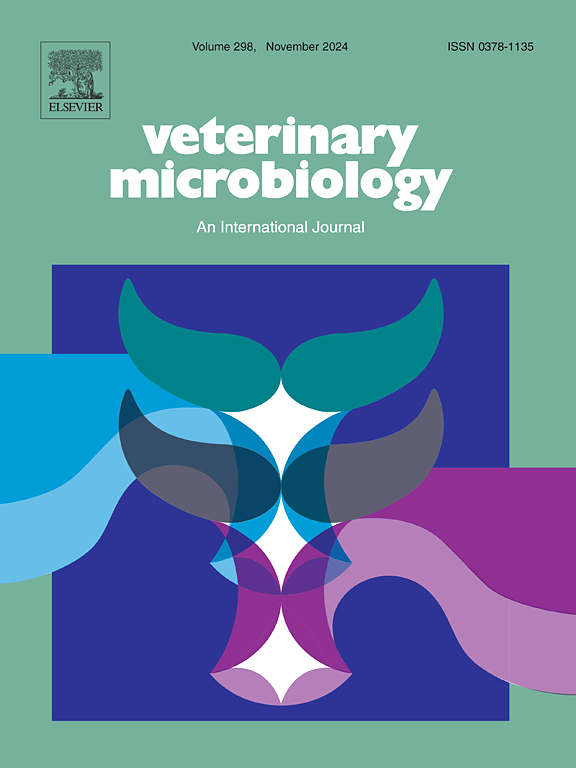TGEV NSP1通过拮抗应激颗粒形成增强病毒复制
IF 2.4
2区 农林科学
Q3 MICROBIOLOGY
引用次数: 0
摘要
应激颗粒(SGs)是一种无膜的细胞器,是对不良外部刺激的反应。在病毒入侵时,SGs的形成可以作为细胞防御感染的机制。传染性胃肠炎病毒(TGEV)是一种α-冠状病毒,具有大的正义单链RNA基因组,可引起仔猪腹泻、呕吐、脱水,甚至死亡。先前的研究表明,冠状病毒采用各种策略抑制SGs的形成,从而促进病毒的复制。然而,TGEV感染与SGs形成之间的相互作用尚不清楚。在本研究中,我们证明了SGs的形成可以通过视黄酸诱导基因I (RIG-I)信号通路增强抗病毒先天免疫,从而抑制TGEV的复制。然而,TGEV通过降低ras - gtpase激活蛋白sh3结构域结合蛋白1 (G3BP1)的蛋白水平来抵消SGs的形成,从而促进其自身的复制。在tgev编码的蛋白中,非结构蛋白1 (NSP1)对SGs形成的抑制作用最强。综上所述,本研究系统地阐明了TGEV与SGs形成的关系,为TGEV的发病机制提供了新的认识,并为寻找新的抗冠状病毒靶点提供了理论基础。本文章由计算机程序翻译,如有差异,请以英文原文为准。
TGEV NSP1 enhances viral replication through antagonizing stress granule formation
Stress granules (SGs) are membrane-less organelles that form in response to adverse external stimuli. Upon viral invasion, SGs formation can serve as a cellular defence mechanism against infection. Transmissible gastroenteritis virus (TGEV), an α-coronavirus with a large positive-sense single-stranded RNA genome, causes diarrhoea, vomiting, dehydration, and even fatality in piglets. Previous studies have shown that coronaviruses employ various strategies to inhibit the SGs formation, thereby facilitating viral replication. However, the interplay between TGEV infection and the SGs formation remains unclear. In this study, we demonstrate that the SGs formation can enhance antiviral innate immunity mediated through the retinoic acid-inducible gene I (RIG-I) signaling pathway, thereby inhibiting TGEV replication. Nevertheless, TGEV counteracts the SGs formation by reducing the protein level of Ras-GTPase-activating protein SH3-domain-binding protein 1 (G3BP1) to promote its own replication. Among the TGEV-encoded proteins, non-structural protein 1 (NSP1) exhibits the strongest inhibitory effect on the SGs formation. In summary, our study systematically elucidated the relationship between TGEV and the SGs formation, providing insights into the mechanism of TGEV pathogenesis and a theoretical foundation for identifying novel anti-coronavirus targets.
求助全文
通过发布文献求助,成功后即可免费获取论文全文。
去求助
来源期刊

Veterinary microbiology
农林科学-兽医学
CiteScore
5.90
自引率
6.10%
发文量
221
审稿时长
52 days
期刊介绍:
Veterinary Microbiology is concerned with microbial (bacterial, fungal, viral) diseases of domesticated vertebrate animals (livestock, companion animals, fur-bearing animals, game, poultry, fish) that supply food, other useful products or companionship. In addition, Microbial diseases of wild animals living in captivity, or as members of the feral fauna will also be considered if the infections are of interest because of their interrelation with humans (zoonoses) and/or domestic animals. Studies of antimicrobial resistance are also included, provided that the results represent a substantial advance in knowledge. Authors are strongly encouraged to read - prior to submission - the Editorials (''Scope or cope'' and ''Scope or cope II'') published previously in the journal. The Editors reserve the right to suggest submission to another journal for those papers which they feel would be more appropriate for consideration by that journal.
Original research papers of high quality and novelty on aspects of control, host response, molecular biology, pathogenesis, prevention, and treatment of microbial diseases of animals are published. Papers dealing primarily with immunology, epidemiology, molecular biology and antiviral or microbial agents will only be considered if they demonstrate a clear impact on a disease. Papers focusing solely on diagnostic techniques (such as another PCR protocol or ELISA) will not be published - focus should be on a microorganism and not on a particular technique. Papers only reporting microbial sequences, transcriptomics data, or proteomics data will not be considered unless the results represent a substantial advance in knowledge.
Drug trial papers will be considered if they have general application or significance. Papers on the identification of microorganisms will also be considered, but detailed taxonomic studies do not fall within the scope of the journal. Case reports will not be published, unless they have general application or contain novel aspects. Papers of geographically limited interest, which repeat what had been established elsewhere will not be considered. The readership of the journal is global.
 求助内容:
求助内容: 应助结果提醒方式:
应助结果提醒方式:


